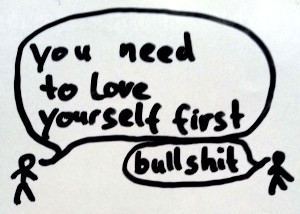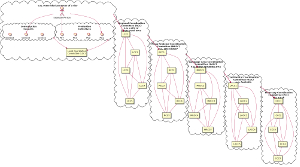
Transformation?
transform-social is about the possibilities of transforming into more social, more solidary, more free, and less coercive societies.
The Anarchist Economics FAQ answers questions about the issues of current economies and how small- and large-scale anarchist economies would work.
Transform into free and solidary societies is an overview article including criticism of existing societies, characteristics for free and solidary societies, and ideas on how to get there.
 Criticism
Criticism
Why do we need transformation? What are the problems of current societies and economic systems? The criticism of the existing is a good starting point for problem analysis and a source of motivation.
Capitalism clearly doesn't work. It does not meet the needs of the people and is in permanent crisis.
Capitalism leads to military conflicts, which is criticized in Antimilitarism.
Capitalism is also one cause of Racism, which is interwoven in many layers of our current society. This has to change.
Challenging the one true love speculates about how capitalism profits from heteronormative relationships.
 Utopias
Utopias
What could transformations develop into? What would more free and more solidary societies be like? Here, Utopias are defined as feasible and constantly developing concepts to give orientation to the transformation.
CyberSyn describes the cybernetic ideas for the economy of Chile in 1971-1973.
Tools for Emancipatory Societies is a lengthy text about the requirements and tools for free and solidary societies.
 Steps towards Transformation
Steps towards Transformation
How can we strive towards utopias? How can the transformation happen?
We don't have to wait for the revolution. We can and should start living the ideas of utopia in the current society as best as possible, thus creating building blocks (both infrastructure and capabilities) that support a successful transformation. This is sometimes referred to as prefigurative politics and sometimes just lived.
Some examples:
- Anarchy and Responsibility is about tackling conflicts in intentional communities
- Rethinking Relationships is about the rejection of relationship norms
What is love?
2026/01
A few thoughts on what love is, what that means for our actions, and what love can be in a transformative practice.
Keywords: Love, Nonviolent Communication, Responsibility, Transformation, Feminism
Societal norms and discrimination also play a role in matters of love.
Love is often associated with strong feelings that can vary from person to person.
that violence and other despicable behavior can never be love, that violence can never be justified with "it was out of love."
Not isolated self-optimization in competition with others, but cooperative, mutually supportive growth.
Reflections on Complexity and Centrality
2025/07
This is a reflection on the experiences from and feedback received at the complex anarchism symposium. It covers discussions around the question of which concepts and tools should be discarded as too central or too dominant in the anarchist context and which structures and tools are required to adequately handle complex systems in a non-hierarchical way.
Keywords: Economics, Anarchism, Cybernetics, Complex Systems
Thus, constraints should not only be scrutinized for being "too central", they can, if applied with anarchist values in mind, also be a measure to prevent a system from becoming authoritarian.
Additionally, to decentralize, keeping data and decisions as local as possible, and local communities focusing on collective care practices are more ideas for agreed on structures or light constraints, that are a safty measure against slighting into central power structures.
Overcome the "complexity despair", the feeling of helpnessness between all these crisis, injustices, and complexities, and to concentrate on how you as an individuum or we as a potential project group can support social systems to develop into anarchist societies.
How to organize the economy in post-revolutionary societies
2025/05
A short text on anarchist economics and the call to think about prefigurative praxis.
Keywords: Economics, Anarchism, Prefiguration
Anarchist bottom-up organization patterns are ideal for handling diverse needs and complexity.
Basing an economy on autonomous individuals means ignoring the need for care work.
Also considering that one element of freedom is planning security: The security of knowing that my needs and the needs of my community will be fulfilled today and in the future gives me the freedom to make plans of my own, to enjoy life without existential worries.
We need prefigurative praxis and concrete plans on how to organize the coming anarchist economies.
Anarchist Debates
2025/01
In this text, I'm pondering on the difference between anarchist debate for educational purposes and anarchist praxis and debating the difference between anarcho-communism and collectivism with respect to anarchist economics in response to a text by a fellow anarchist.
Keywords: Economics, Anarchism, Spain 1936-39, Care, Intersectional Anarchism
For educational purposes, it still makes sense to clearly and constructively state and discuss the differences and pros and cons of different anarchist currents.
I consider all needs individual but I'm not worried about that concerning the ability to plan economies or to handle scarcity.
Anarcho-communism makes all types of needs, including those for care (reproductive work), first-class citizens of the economic planning process.
This makes them the exception from the norm and the passive dependent receivers of social benefits, which is degrading and ableist.
Intersectional thinking also prevents us from proposing universal dogmatic solutions that are supposed to be the blueprint of utopia, the "right" way to life as imposed on all of us in a colonial fashion.
Anarcho-Communist Planning
2024/06
The anarcho-communist approach of decentralized economic planning presented in this paper enables everyone to participate in decisions they are affected by, including all aspects of the economy from consumption preferences and the distribution of scarce resources, over production processes, to organizational aspects and long-term resource distribution and development. These extensive participation possibilities exceed what is usually considered democratic participation. It is facilitated by networked forms of organization and supporting federated cybernetic information tools. This form of decentralization absorbs complexity at the local level while focusing on the needs of the people and fighting injustices, discrimination, and structures of domination.
Keywords: Planetary Boundaries, Economics, Anarchism, Decentralization, Cybernetics
Thus central planning should not only be rejected because it does not handle informational complexity well, but also because it is prone to technocracy, bureaucracy, and takeover by authoritarian forces.
After getting used to self-organized conflict resolution, the processes will become more common and easier to digest.
They provide information, transparency, analysis, research, and suggestions, and facilitate decision-making and conflict resolution but they do not enforce decisions on others.
the federation is no power structure
It creates networks of responsibilities in which nodes have specific functions and responsibilities and pass important information in aggregated form to each other.
That way, the monolithic task of planning is broken down into manageable subtasks, increasing the chances of successful complexity handling and meeting self-defined goals.
It is colonial thinking to assume one way of living and organizing fits everyone or one central unit can decide about the needs of everyone.
Anarchist Economics FAQ
2024/01
This text answers more than 75 frequently asked questions about anarchist economies.
Keywords: Economics, Anarchism
The complexity and fragility can be reduced by methods of decentralization and encapsulation, allowing everyone to understand the relevant parts of economics.
The capitalist way of doing economics has led to a severe climate crisis and huge social injustices.
For scarce consumer goods, individuals and communities with a higher need (e.g. medical conditions, regions that suffered more under capitalism) should be preferred in the distribution.
Let's build many anarchist economics oases, bridges, and networks within the capitalist desert until the wildflowers start growing all over.
Is it true that "You can’t love someone until you learn to love yourself"?
2023/12
"You can’t love someone until you learn to love yourself" is not only wrong but also has various harmful aspects.
Keywords: Love, Relationships, Mental Health, Capitalism
Capitalism and patriarchy tell us that we have to fit certain beauty standards and gender norms.
Let's rather face these issues of the world, society, and ourselves together, in solidarity.
It's okay to improve self-love and mental health while being in a relationship.
Anarchist Economics in times of Scarcity
2023/11
A brief fictional story to make it easier to imagine anarchist economics in times of scarcity.
Keywords: Economy, Anarchy, Scarcity, Draft
The anarchist utopia is not dependent on everything being available in abundance.
No one had paid any attention to the water meters for a long time - after all, water, like everything else, was freely accessible and metering was therefore irrelevant.
Bo didn't have to worry about anything else.
Tools for Emancipatory Societies
2023/03
This article discusses abstract requirements for future societies based on ethical values, concrete organizational foundations for economic and social planning, and required organizational and technical tools. It also shows how the method of simulation can be used as one tool to support (not dominate) anarchist societies.
Keywords: Economy, Decentralized, Cybernetics, Anarchism
Cybernetics is not about control in the authoritarian sense but about control in the sense of self-regulating and self-organizing, i.e. anti-authoritarian systems.
Decentralization does not mean isolation or rejection of modern technology.
I'm suggesting the use of optimization as an optional tool for multi-level decentralized planning, creating non-coercive suggestions as a decision support tool.
The individualists did not have a huge impact on the solidarity economy.
Rethinking Relationships
2023/02
Notes on toxic and non-toxic relationships patterns, how to break relationship related societal norms and how structures of dominance fuck with relationships.
Keywords: Love, Polyamory, Relationship Anarchy, Society, Relationships, Capitalism
Let's live in relationships that are good for us and undermine dominance structures.
Never let someone tell you, you would not be able to "really" love someone.
Polyamory might not be for everyone but the skills you learn are.
Antimilitarism
2022/03
A short overview of antimilitarist movements and reasons to reject wars.
Keywords: Antimilitarism, Nonviolence, Pacifism, War Resisters International
Strive for the removal of all causes of war.
Some pacifists support the idea of "peaceful military missions", others (like the anarcho-pacifists) do not.
Racism
2021/12
Reflecting on racism from a white perspective. Looking at the various forms of oppression that come with racism.
Keywords: Racism, Oppression, Intersectionality, System
It should not be the responsibility of BIPoC to explain racism to white people.
Race does not exist, but race matters.
Racism can lead to severe psychological damage.
CyberSyn - An Ambitious Project of Socialist Economics
2021/04
50 years after the short but inspiring history of CyberSyn, there is still a lot to learn from this project and its underlying theory of organizational cybernetics.
Keywords: Economy, Decentralized, Cybernetics
Hold on for this ride back in history that still feels like science fiction.
In complex systems, central control is not viable.
Beer explains why only decentralized organizations can cope with complex environments.
It is a source of inspiration for decentralized anarchist economies.
Invisible Women in the German Asylum-System
2021/04
This interview with an activist from Women in Exile gives some insight into the situation of women in Kenya, refugee camps, and the German Asylum system.
Keywords: Asylum, Women, No Camps
However, being locked in a prison inside of a prison is not the solution.
When you have to fear being deported every day, you don’t really worry about climate change.
Migration due to climate change might increase and it should not be illegalized.
How would Anarchist Societies handle a pandemic?
2020/04
Some thoughts about how anarchist societies could handle a pandemic.
Keywords: Utopia, Anarchy, Society
That way, each community can decide about their balence between freedom and security and define for themselves the meaning solidarity in times of pandemic.
However, if it turns out that the pandemic can't be stopped with decentral diversity, there might be a need for a global decision.
Transformation into Free and Solidary Societies
2019/05
Criticism of current societies, how free and solidary societies could be organized and how to get there.
Keywords: Free And Solidary Societies, Transformation, Strategy
This is not one idea, pattern or blueprint of free and solidary societies, but rather a framework, in which multiple diverse ideas of living together and organizing can co-exist.
Thus the power stays decentral and local, always focused on the needs of the people while still being able to make decisions globally.
Anarchy and Responsibility
2015/07
If you want to be part of a consensus-based anarchist project you should discuss in that group what being responsible for the decisions you made and the rules you agreed upon really means. This includes talking about processes of conflict resolution and separation.
Keywords: Anarchy, Responsibility, Consensus, Separation, Organization, Conflicts
These rules are only worth the time needed to agree on them as a group if the group takes the responsibility to stick to them.
The idea of anarchist societies is not based on the idea of all people wanting the same, but on the idea of decentral groups each acting in their way as long as it does not affect others. In such a society separation from one group and joining an other or even traveling through some groups would not be a sign of failure of the first group or the individual but a chance for personal and group development.
















